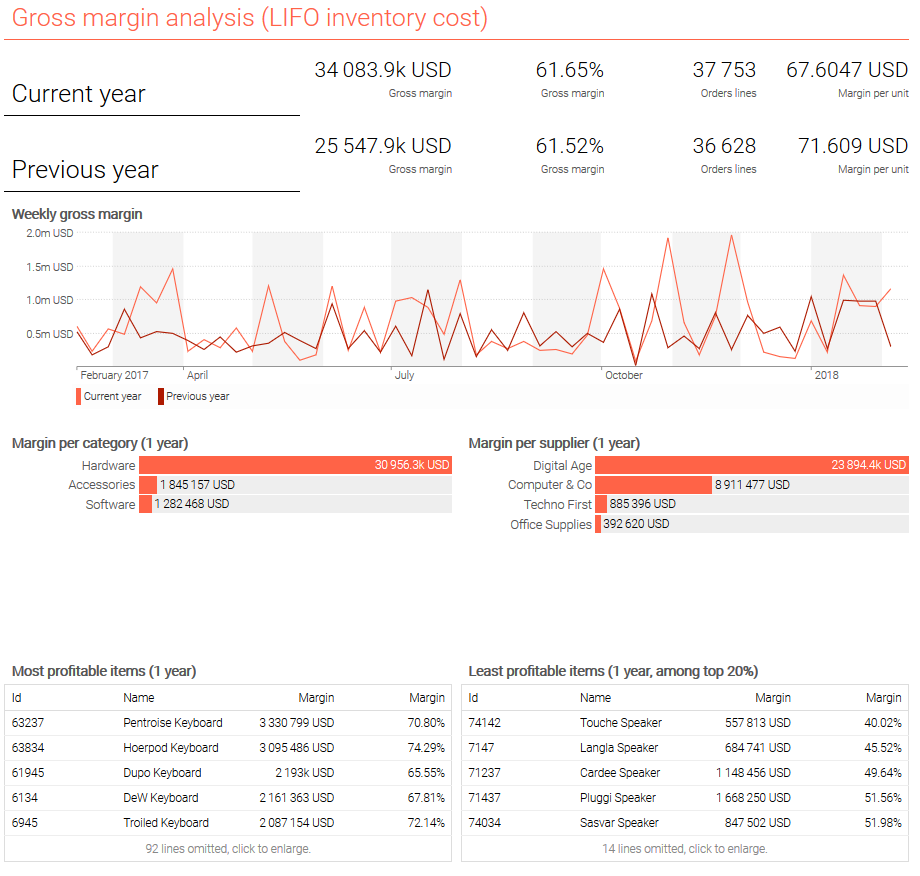Basic margin analysis
The script below illustrates how a gross margin analysis dashboard can be composed with Envision.
Check this script on the playground

read "/sample/Lokad_Items.tsv" as Items[id] with
"Id" as id : text
Name : text
Category : text
Supplier : text
read "/sample/Lokad_Orders.tsv.gz" as Orders expect [id, date] with
"Id" as id : text
"Date" as date : date
Quantity : number
NetAmount : number
Currency : text
read "/sample/Lokad_PurchaseOrders.tsv" as PO expect [id, date] with
"Id" as id : text
"Date" as date : date
Quantity : number
NetAmount : number
Currency : text
show label "Gross margin analysis (LIFO inventory cost)" a1f1 { tileColor: tomato }
oend = max(Orders.date)
lastMonday = monday(oend)
// Default currency, and currency conversions
currency = mode(Orders.Currency) when (date >= oend - 365)
Orders.NetAmount = forex(Orders.NetAmount, Orders.Currency, currency, Orders.date)
PO.NetAmount = forex(PO.NetAmount, PO.Currency, currency, PO.date)
// LIFO inventory value
PO.UnitPrice = PO.NetAmount / max(1, PO.Quantity)
//Orders.CostAmount = latest(PO.UnitPrice) * Orders.Quantity
Orders.CostAmount = (last(PO.UnitPrice) by PO.id at Orders.id over [.. 0] ) * Orders.Quantity
Orders.Margin = Orders.NetAmount - Orders.CostAmount
// Top row of KPIs
show label "Current year" a2b2
where date >= oend - 365
show scalar "Gross margin" c2 with sum(Orders.Margin) { unit: #(currency) }
show scalar "Gross margin" d2 with sum(Orders.Margin) / sum(Orders.NetAmount) { unit: "%" }
show scalar "Orders lines" e2 with count(Orders.*)
show scalar "Margin per unit" f2 with
sum(Orders.Margin) / sum(Orders.Quantity) { unit: #(currency) }
show label "Previous year" a3b3
where date >= oend - 2 * 365 and date < oend - 365
show scalar "Gross margin" c3 with sum(Orders.Margin) { unit: #(currency) }
show scalar "Gross margin" d3 with sum(Orders.Margin) / max(1, sum(Orders.NetAmount)) { unit: "%" }
show scalar "Orders lines" e3 with count(Orders.*)
show scalar "Margin per unit" f3 with
sum(Orders.Margin) / max(1, sum(Orders.Quantity)) { unit: #(currency) }
// Linechart
Week.margin = sum(Orders.Margin)
where date >= lastMonday - 52 * 7 and date < lastMonday
{ unit: #(currency) }
show linechart "Weekly gross margin" a4f6 { tileColor: tomato } with
Week.margin as "Current year"
Week.margin[-52] as "Previous year"
table Categories[category] = by Items.Category
Orders.category = Items.category
table Suppliers[supplier] = by Items.Supplier
Orders.supplier = Items.supplier
// Split by category and supplier
where date >= oend - 365
{ unit: #(currency) }
show barchart "Margin per category (1 year)" a7c9 { tileColor: tomato } with
sum(Orders.Margin)
group by category
{ unit: #(currency) }
show barchart "Margin per supplier (1 year)" d7f9 { tileColor: tomato } with
sum(Orders.Margin)
group by supplier
// Tops and flops
where date >= oend - 365
where (sum(Orders.NetAmount) into Items) > 0
show table "Most profitable items (1 year)" a10c12 with
id
Items.Name
sum(Orders.Margin) as "Margin" { unit: #(currency) }
sum(Orders.Margin) / sum(Orders.NetAmount) as "Margin" { unit: "%" }
group into Items
order by sum(Orders.Margin) desc
Items.R = rankd(sum(Orders.Margin))
where Items.R <= 0.2 * max(Items.R) by 1
show table "Least profitable items (1 year, among top 20%)" d10f12 with
id
Items.Name
sum(Orders.Margin) as "Margin" { unit: #(currency) }
sum(Orders.Margin) / sum(Orders.NetAmount) as "Margin" { unit: "%" }
group into Items
order by sum(Orders.NetAmount) / sum(Orders.Margin) desc